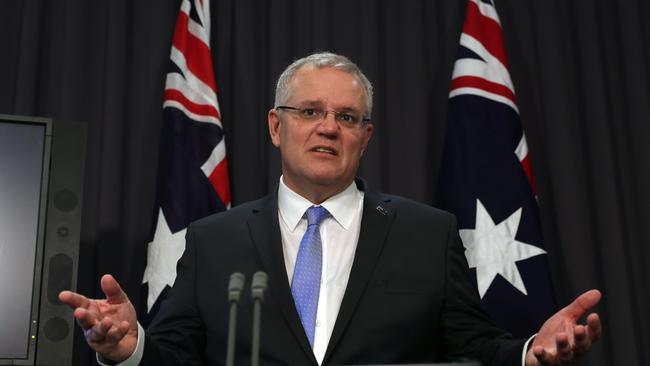Productivity Commission urges Canberra to rein in ‘opaque’ banks, insurers
The Productivity Commission has condemned the “persistently opaque pricing”, “conflicted advice” and regulations that “support larger incumbents”.

The government has been urged to rein in the market power of Australia’s biggest banks and insurers, as the Productivity Commission condemned the “persistently opaque pricing”, “conflicted advice” and regulations that “support larger incumbents”.
That trailing commissions offer “no evident link to customer best interests” and should be banned from the mortgage broking industry is one of numerous recommendations made by the government’s policy adviser following a lengthy review of competition in the financial system.
The scathing review also said all banks should appoint an internal integrity officer, who would report to the corporate watchdog if companies failed to heed warnings about payments that conflicted with a customer’s best interest.
Regulators were also targeted by the commission, which said the Australian Competition & Consumer Commission needed to promote competition inside regulator powwows to ensure the interests of customers and the costs imposed on them are considered.
Insurers should face a Treasury-led proposal to introduce a deferred sales model for all sales of add-on insurance, a type of mostly useless protection sold in car yards and attached to other high-value purchases, which has plagued consumers and been the target of several investigations by the Australian Securities & Investments Commission.
“The larger financial institutions, particularly but not only in banking, have the ability to exercise market power over their competitors and consumers,” the Productivity Commission report, led by the department chair Peter Harris, said.
“Many of the highly profitable financial institutions have achieved that state with persistently opaque pricing; conflicted advice and remuneration arrangements; layers of public policy and regulatory requirements that support larger incumbents; and a lack of easily accessible information, inducing unaware customers to maintain loyalty to unsuitable products.”
Treasurer Scott Morrison launched the report on Friday and savaged the big banks for punishing loyalty and keeping customers “in the dark”. He said customers who stayed with the same bank are being punished with higher fees, noting there is “no genuine transparency around product and pricing”.
.@ScottMorrisonMP: You could be a show pony and do what @billshortenmp is doing, wrapping everyone in cotton wool and making promises he could never fulfil, or see the Royal Commission as part of a broader plan which we've been implementing.
— Sky News Business (@SkyBusiness) August 3, 2018
MORE: https://t.co/wwhUGqJJoA #Ticky pic.twitter.com/IouY602Dbw
“The price of loyalty? Between $66 to $87 per month on the average home loan balance,” Mr Morrison told the Australian British Chamber of Commerce in Sydney.
The PC said poor financial advice and complex information led to expensive products that were persistently pushed specifically to boost institutional profits. “What often is passed off as competition is more accurately described as persistent marketing and brand activity designed to promote a blizzard of barely differentiated products and ‘white labels’,” the report said.
“In home loan markets, the mortgage brokers who once revitalised price competition and revolutionised product delivery have become part of the banking establishment. Fees and trail commissions have no evident link to customer best interests.”
The PC found some brokers were earning $6000 for an average home loan of about $350,000, which created “perverse incentives” for brokers to stop borrowers switching banks.
“Trail commissions should be banned and clawback of commissions from brokers restricted,” it said “All brokers, advisers and lender employees who deliver home loans to customers should have a clear legally-backed best interest obligation to their clients.”
Prime Minister Malcolm Turnbull said the banks should remember the principle of reciprocity and put their customers first.
“We should do unto others what we’d have them do unto us. That’s good advice in every time,” Mr Turnbull said.
“The many failings and wrongs that have been done have all stemmed from a failure to put the customer first, to recognise that banks have a duty to look after their customers, and we are committed to ensure that those who have done the wrong thing will be held to account, and that the wrongdoing will not be repeated.
“We’ve made a lot of reforms already. The royal commission is under way. You’ve seen the Productivity Commission report, which will obviously be considered by the royal commission.
“We are very attracted to the proposals to have a principal integrity officer in large financial institutions, but we will await the final report of the royal commission before we respond definitively to the recommendations of the Productivity Commission.






To join the conversation, please log in. Don't have an account? Register
Join the conversation, you are commenting as Logout